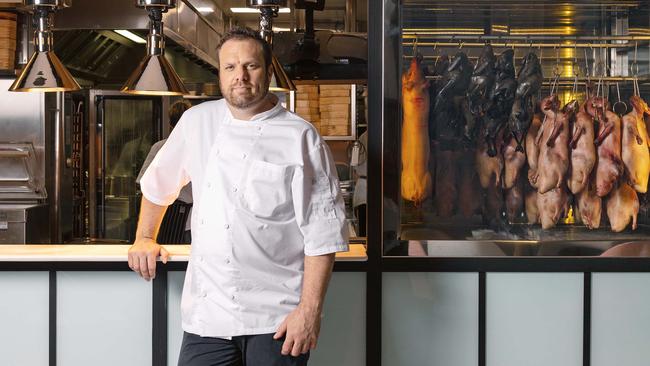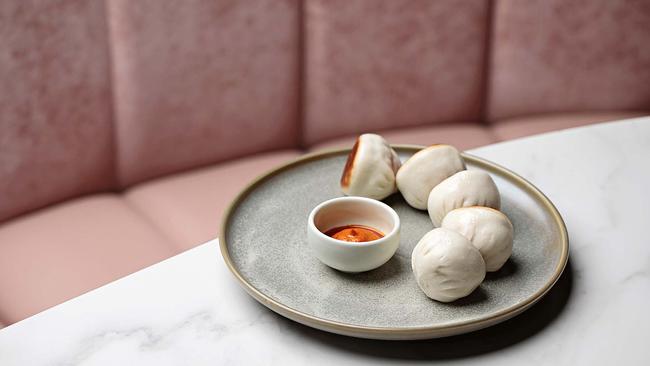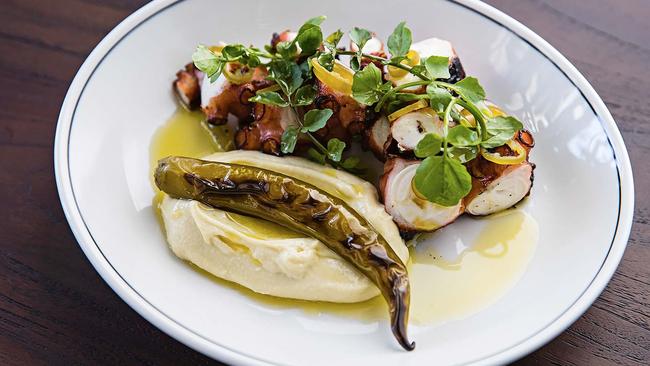Fine dining in Brisbane: Donna Chang; Greco; Hellenika; Mr Percival’s; Toko Brisbane
A rash of restaurant openings late last year gave impetus to the notion of a sudden boom.

When Victorian chef Jake Nicolson left a prestigious job at Melbourne’s Circa restaurant almost six years ago for a new but untested role with an emerging group in Brisbane, more than one of his peers in the tight-knit Victorian cooking community muttered: “Really? Brisbane?”
Did Nicolson know something the rest of us did not? And is he now, as executive chef of a group that includes the super-hot modern Cantonese restaurant Donna Chang and five other bustling spaces, having the last laugh?
In the time since Nicolson’s arrival, Brisbane’s food scene has changed markedly. Choice, quality and ambition are back after a period when it seemed the restaurant business needed to be dumbed down, millennially focused and often Americanised to survive. “It really did have that big-country-town vibe going on,” says Nicolson, who carries creative responsibility for The Ghanem Group’s six restaurants. “It was the perfect platform for me to make a lot of people very happy by simply cooking delicious food.”
A rash of restaurant openings late last year gave impetus to the notion of a sudden boom, but restaurateur Simon Gloftis, who opened the Brisbane version of his Gold Coast institution Hellenika at the swish new Calile Hotel and is very much part of the new wave, disputes the suggestion of overnight success.
“It’s fair to say Brisbane’s dining and entertainment has come of age lately,” he agrees. “(But) the falsehood being thrown around is that it all suddenly happened overnight. Truth is, the recent spate of restaurants and hotel openings has been in some cases nearly a decade in the making. They can be attributed to some very clever individuals and a series of well-planned and well-thought-out baby steps.”
Gloftis, who has two prominent Gold Coast restaurants, credits “guys (who) have worked so hard to give the Brisbane food scene a solid foundation” – Brisbane veterans Michael Platsis, John Kilroy, Andy Georges, the Gambaro family, Paolo Biscaro, Simon Hill and Thierry Galichet.
But a new wave of developers, entrepreneurs, restaurateurs and chefs is shaking the city’s trunk, and some interesting fruit is falling out.

In six months last year, Brisbane saw the opening of Donna Chang, the Brisbane Hellenika and Greca – a sibling to Potts Point’s new-wave Greek taverna The Apollo. Several lower-profile openings added to the boom narrative, while the launch of a major new food and wine precinct, Howard Smith Wharves, helped fuel the publicity fire.
HSW includes Greca; Toko Brisbane (a spinoff of the successful mod-Japanese Sydney and Melbourne group); Stanley, which is opening soon, a 180-seat Cantonese eatery by local restaurateur Andrew Baturo; the bar/bistro Mr Percival’s; a micro brewery, Felons; and another restaurant to open in the first half of this year.
“The city is absolutely booming,” says the Sydney-based chef/restaurateur behind Greca, Jonathan Barthelmess, whose interests include two places in Sydney (Apollo, Cho Cho San) and another Apollo in Tokyo. “Having grown up on the Gold Coast, I’ve always wanted to open a restaurant up north. The Howard Smith Wharves development presented the perfect location to finally make the jump.”
Adam Flaskas is the entrepreneurial face of HSW, which connects the waterside suburb of New Farm with the city proper; he won the rights to redevelop the 3.43ha site in December 2015. “I’m confident we’ll have at least four or five bars and restaurants that will be among the top offerings in Australia,” he tells The Deal.
Flaskas developed Halcyon House, at Cabarita Beach in northern NSW, with one of the country’s best small hotel restaurants – Paper Daisy – so he has runs on the board. “It’s going to be exciting to have a Cantonese Chinese, a Japanese, a Greek and a modern Australian restaurant to choose from,” he says. “Hard to pick, but it means you can be down there most nights enjoying something different.”
So much has changed in the past 10 years, Flaskas says. “We have a very forward-thinking Lord Mayor, Graham Quirk, and his team, who have been major contributors to Brisbane becoming a new world river city.”

An increase in the tourism/travel sector both internationally and domestically has fuelled demand too, contributing to what Flaskas describes as “pent-up demand” from Brisbane diners needing and wanting more new venues.
At the handsome new Calile Hotel, Gloftis is riding a wave of critical and commercial success. “Brisbane is on the frontline of what I believe will be a worldwide phenomenon – the hotel restaurant,” he says.
“I remember years ago, admitting that you ate in the hotel restaurant was actually embarrassing. We would justify it by saying things like ‘oh, we were just so tired, so we ate in because we couldn’t be bothered’. But now with the help of some clever hoteliers and their deep pockets, the hotels are able to entice quality restaurateurs to open up world-class venues.
“Hotels can provide the infrastructure to underpin a quality restaurant, like beautiful fitouts, onsite parking, toilets within reach that you don’t need some key on a chain to access, and deep wine lists. To me, it’s a lay down misere.”
Gloftis is talking about people such as developer Michael Malouf, whose creation of the Calile Hotel in Fortitude Valley is just the latest in a long involvement with food and wine in Brisbane. Malouf’s journey started in 2002 with the creation of James Street Market, “a food-centric retail centre that assembled specialty food providores in a market-style format”.
A great wine bar and cellar was crucial to the mix, Malouf says; Cru Bar + Cellar is now a Brisbane institution. “After working in this precinct for almost 20 years, I’m proud to say James Street is now one of the most successful retail high streets in the country. It’s within this sort of precinct that new restaurants have a better chance to flourish.”
Malouf laments the lack of interesting old buildings in Brisbane for restaurateurs to repurpose. He cites the example of Bar Alto, at the former Powerhouse on New Farm’s riverfront, as an example of what can be done with the right heritage site. “But examples like this are rare in a city that was built predominantly on the tin-and-timber vernacular,” he says. “It’s our job as developers to deliver new buildings that have more of an enduring civic character, so that we start to define the new architectural precedent.”
Malouf describes Brisbane as the maturing adolescent “previously lacking a bit of confidence, embarrassed by the things that made it different. Now Brisbane is growing up – more self-assured and starting to embrace its unique qualities.”
There are many factors in the mix for the creation and sustainability of a single restaurant, let alone a whole new batch. Raw produce and skilled labour are pivotal.

According to chef Nicolson, his five-plus years in Brisbane have seen a “huge increase” in suppliers and accessibility to the country’s best ingredients. “Much of the local produce had a stronger market in the southern states as well as export when I arrived, which actually made it a challenge to keep some locally produced ingredients in Queensland. The logistics of fruit and veg coming into the Brisbane markets could mean it took up to four days to arrive via road trucks.”
Things have changed for the better, Nicolson says. But expanded demand for service staff in the city has meant growing pains on the human resources front of hospitality in Brisbane. “The city is playing catch-up to employ and train staff,” Nicolson says. “It’s definitely the biggest issue we face and can mean varying service experiences. Talented staff are hard to come by and passionate staff naturally make the move south or overseas to broaden their horizons.”
Flaskas agrees. “We are experiencing a surge in the hospitality sector, but we’re not seeing a surge in amazing, well-trained, service-focused staff,” he says. “One of the biggest challenges is finding outstanding service-focused people who see it as their career.”
This is not something that can be turned around quickly. Restaurateurs who don’t invest in training are sowing the seeds of discontent, yet it’s difficult to dismiss their objections: “It costs money to train staff who then leave anyway.”
The final word goes to Hellenika’s perennially optimistic Gloftis: “Brisbane is not Melbourne or Sydney and honestly, nor does it want to be. We may never reach parity but what is important is that we are doing it our own way.”



To join the conversation, please log in. Don't have an account? Register
Join the conversation, you are commenting as Logout